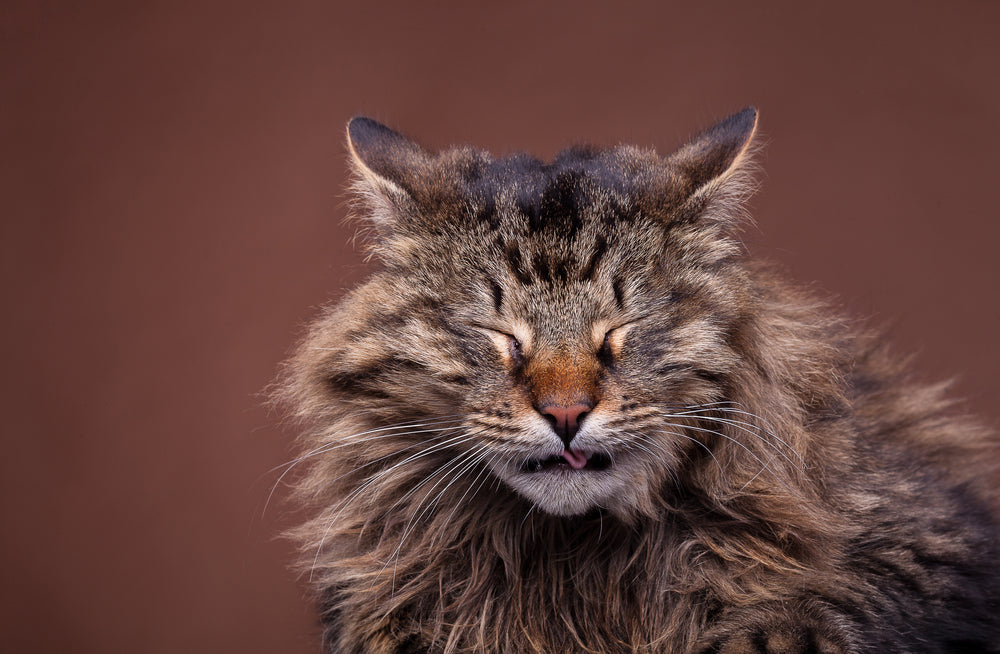An occasional sneeze from your cat is cute and sometimes funny, but what about if it sneezes regularly? What if your cat can’t stop sneezing? Is it anything to worry about?
Watching our furry friends sneezing is usually amusing. A tiny snort and little explosion of air is fine as long as it isn’t on our hand or in our face.
Regular sneezing could be something else altogether.
It isn’t necessarily anything to worry about though.
Sneezing cat
Cats can sneeze for the same reasons humans sneeze. It could be an irritation in the nose, dry air, dust or something up the nose or a particularly strong smell.
It can also be an infection, inflammation or a sinus issue.
As a general rule, if your cat sneezes occasionally and only once or twice, it’s probably nothing to worry about.
It could be all those reasons above, dust, dry air or an irritation of some kind.
If you have just finished vacuuming or have used air freshener in the bathroom and your cat sneezes, there’s probably a direct link between the two.
If you have just started using air fresheners or scented candles and your cat starts sneezing, they are telling you they don’t like the smell.
Your first steps can be to remove any strong smells, stop using those smelly products like scented candles, open a window or door to air the house and check the cat litter box for particularly dusty litter.
The causes are usually easy to identify and to fix.
When it’s more than just a cat sneezing a lot
If your cat sneezes all the time or can’t stop sneezing, it could be something else entirely. That’s the time to study your little friend more closely to make sure they are okay.
Keep an eye on them and check for leakage from the eyes or nose after they sneeze. This could indicate an infection and will require a trip to the vet to make sure they are okay.
They won’t enjoy that trip but it’s definitely better safe than sorry!
If your cat loses their appetite or seems restless for no reason, that may also require a trip to the vet.
Cats are susceptible to respiratory infections and loss of appetite and the inability to settle are two signs of that.
If your cat usually spends their evening curled up on your lap but suddenly can’t settle in one place, monitor the situation.
Give it a day or two and see what happens. If there’s no improvement or symptoms get worse. It’s worth a visit to the vet.
Don’t wait longer than a day or two though. Where dogs can go several days without eating and aren’t affected, cats can only miss a couple of meals safely.
Signs of respiratory infection in cats
There are a few key signs of respiratory infection in a cat. Keep an eye on them to see if they display any of the following:
- Regular sneezing over a few days
- Discharge from the eyes or nose (clear, yellow, green or blood)
- Loss of appetite even for their favourite treats
- Frequent coughing or swallowing
- Lethargy or inability to settle and sleep
- Decreased thirst
If your feline companion displays any of these symptoms for more than 24 hours, it’s time for a vet visit. It may be nothing but it may be something and we want our cats to receive the best care possible!
There are a few treatments for respiratory infections including medication, nose or eye drops, steroids and fluids if your friend is dehydrated.
The sooner you get your cat checked, the sooner you can both get back to your normal routine.
Other causes of a sneezing cat
The vast majority of sneezing episodes will usually just be dry air or a smell they don’t like.
The other most common cause is respiratory infections as we just discussed. There are other causes though.
Causes such as allergies, feline leukaemia, feline immunodeficiency virus (FIV), infectious peritonitis and others.
These are less common and can be identified during a vet visit. All of them are treatable if caught early enough.
If you have a sneezing cat in the family, this is nothing to worry about if it happens occasionally. But if it becomes more persistent, we would recommend getting it checked out by a professional.
If in doubt, always check with the vet. We can all use our intuition and how well we know our four legged friends but nothing beats training and experience!

